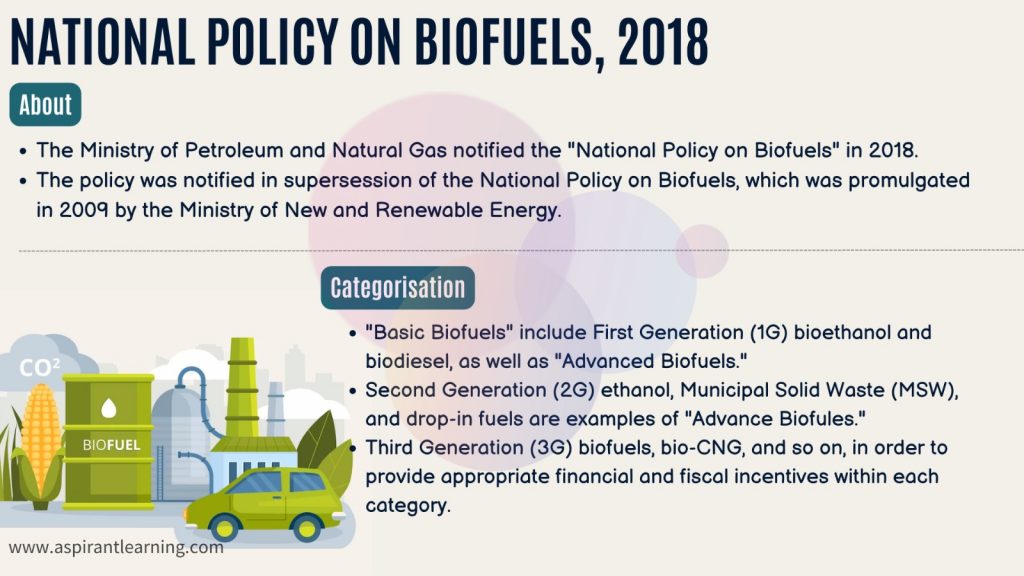News Highlight
The export policy for biofuels from special economic zones and export-oriented units is unrestricted for fuel and non-fuel purposes.
Key Takeaway
- The government announced that biofuel exports from special economic zones and export-oriented businesses are permitted for gasoline.
- In addition, non-fuel purposes are permitted without restriction.
- The biofuel is made from the imported feedstock.
- On August 28, 2018, the government implemented export limitations on biofuels, just days after imposing similar import curbs.
Biofuels
- About
- A biofuel is any hydrocarbon fuel that is created in a short period from organic matter.
- Biofuels can be solid, liquid, or gaseous.
- Solid: Wood, dried plant material, and manure
- Liquid: Bioethanol and Biodiesel
- Gaseous: Biogas
Categories of Biofuels
- First Generation Biofuels
- They are made with conventional methods from food sources such as sugar, starch, vegetable oil, or animal fats.
- Common first-generation biofuels include bio-alcohols, biodiesel, vegetable oil, bio-ethers, and biogas.
- Despite the ease of conversion, using food sources to make biofuels disrupts the food system, raising food prices and contributing to hunger.
- Second Generation biofuels
- They are created from non-food crops or byproducts of food crops that cannot be consumed, such as fruit peels, husks, stems, and wood chips.
- These fuels are produced using thermochemical or biochemical conversion processes.
- In addition, Biodiesel and cellulose ethanol are two examples.
- Although these fuels do not affect the food economy, their production is difficult.
- Furthermore, as compared to first-generation biofuels, these biofuels are said to emit fewer greenhouse gases.
- Third-Generation Biofuels
- They are created by microorganisms such as algae.
- Butanol is an example.
- Fourth Generation Biofuels
- Crops genetically modified to absorb huge amounts of carbon are grown and harvested as biomass in producing these fuels.
- Second-generation procedures are then used to transform the crops into fuel.
- Additionally, the fuel is pre-combusted, and carbon is captured.
- The carbon is then geo-sequestered, storing it in unmineable coal seams or exhausted oil and gas fields.
- Several of these fuels are carbon negative because their production removes carbon from the environment.
Significance
- Energy Security
- Biofuels can lessen reliance on fossil fuels frequently imported from other nations.
- Countries can strengthen their energy security and reduce their vulnerability to supply disruptions by locally generating biofuels.
- Environmental Benefits
- Biofuels are more environmentally friendly than fossil fuels since they emit fewer greenhouse gases when burned.
- In addition, manufacturing biofuels can help reduce waste and pollution.
- Agricultural Development
- Biofuel manufacturing necessitates a substantial amount of feedstock, which might give farmers a new source of revenue.
- This can also aid in promoting rural development and agricultural output growth.
Effects of the export policy for biofuels
- The unsustainability of cash crops
- Growing reliance on biofuels may encourage farmers to produce more water-intensive crops such as sugarcane and rice.
- Huge water requirement
- Now consume 70% of available irrigation water, negating some of the environmental benefits of producing more ethanol.
- Food and nutrition security
- Reducing the coverage of food security initiatives, the measure may influence India’s hunger crisis.
- Food inflation
- Food costs may rise due to the diversion of mass-consumption cereals.
Recent Initiatives Regarding Biofuels
- Pradhan Mantri JI-VAN Yojana, 2019
- GOBAR (Galvanizing Organic Bio-Agro Resources) DHAN scheme, 2018
- National Policy on Biofuels, 2018

Way Forward
- Promoting the use of biofuels in transportation in countries such as India will help to reduce the country’s crude import expense.
- Biofuels can aid rural and agricultural growth through new cash crops.
- Furthermore, wastelands and municipal garbage from cities should be used to develop sustainable biofuels.
- A well-planned and executed biofuel solution can produce both food and energy.
Pic Courtesy: freepik
Content Source: Economic Times



